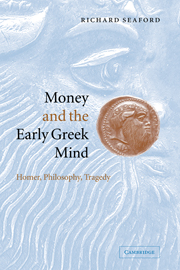Book contents
- Frontmatter
- Contents
- Preface
- List of abbreviations
- 1 Introduction
- PART ONE THE GENESIS OF COINED MONEY
- PART TWO THE MAKING OF METAPHYSICS
- 9 Did politics produce philosophy?
- 10 Anaximander and Xenophanes
- 11 The many and the one
- 12 Heraclitus and Parmenides
- 13 Pythagoreanism and Protagoras
- 14 Individualisation
- 15 Appendix: was money used in the early Near East?
- References
- Index
11 - The many and the one
Published online by Cambridge University Press: 22 September 2009
- Frontmatter
- Contents
- Preface
- List of abbreviations
- 1 Introduction
- PART ONE THE GENESIS OF COINED MONEY
- PART TWO THE MAKING OF METAPHYSICS
- 9 Did politics produce philosophy?
- 10 Anaximander and Xenophanes
- 11 The many and the one
- 12 Heraclitus and Parmenides
- 13 Pythagoreanism and Protagoras
- 14 Individualisation
- 15 Appendix: was money used in the early Near East?
- References
- Index
Summary
WHY MONISM?
On the earliest philosophers Aristotle writes as follows.
That of which all existing things consist and from which they first come to be and into which they finally pass away (the being, ousia, remaining but changing in its modifications), this they say is the element and principle (archē) of all existing things, and therefore they think that nothing is generated or destroyed, as this kind of being is always preserved.
(Met. A 983b6ff.)The first such thinker, Aristotle adds, was Thales, whose archē was water. Philosophical cosmology begins not from the detailed information about various materials known to artisans, but from comprehensive and abstract principles. The belief that all things are in fact one can be ascribed also, in various forms, to Anaximander, Anaximenes, Xenophanes, Heraclitus, and Parmenides.
It is an odd belief, especially in a polytheistic society. Why was it unanimously maintained by these philosophers? We cannot explain it merely by the ‘economy and simplicity’ characteristic of science or the ‘drive for epistemological power over nature’. Monism is sufficiently antithetical to the observed world as to incur irresolveable contradiction, even within the views of its adherents. This point is honestly faced by Michael Stokes.
There has been suggested in print no good reason for so strange a beginning in Greek philosophy. Nor does common sense afford any suggestion to alleviate its strangeness; the world around us has nothing obviously suggesting a single material.
Stokes rightly rejects various explanations as inadequate.
- Type
- Chapter
- Information
- Money and the Early Greek MindHomer, Philosophy, Tragedy, pp. 217 - 230Publisher: Cambridge University PressPrint publication year: 2004



